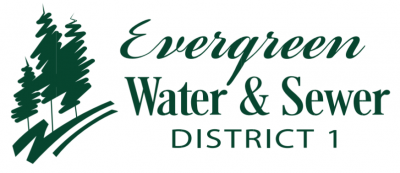To serve you better, we've assembled a list of our customers' most frequently asked questions. If you don't find your answer here, feel free to contact us.
My water/sewer bill went up considerably is there something wrong with my meter?
You could possibly have a leaky toilet or faucet that's difficult to detect. Just call the office and we'll work with you to solve the problem.
What do I do if I am experiencing low pressure?
Check your meter and the surrounding area for possible leaks. Next, call our office and report low pressure for your area.
Why is my water discolored?
A repair could have been completed recently, allowing air to enter the line and cause a milky look.
How hard is the water in Evergreen? What is the pH?
The water in the Evergreen Water and Sewer District has 11 grains of hardness (that's pretty hard!) The pH is 7.8.
Why does debris come out of the faucet when running hot water?
It is likely that your water heater needs to be flushed. CAUTION: Most manufacturers recommend hiring a professional to flush your water heater. If you plan on doing this yourself, read the owner's manual to keep from being hurt and or damaging the water heater.
Why do I have a previous balance when I know I sent in my payment?
We may have received your payment after the due date or we may not have received it at all. Call our office and we will help you solve the problem.
I found a card on my door that says my meter isn’t working what does this mean?
If a serviceman hangs a tag about your meter it means the meter has stopped working or the transponder attached to the meter has stopped working. If you get this card simply call the office to set up a time the serviceman can come over and repair the problem. The District is responsible for the meter and there is no charge to the homeowner for the repair unless it was damaged due to neglect or tampering.
Who is supposed to clear snow & ice from fire hydrants?
The customer(s) are responsible for snow & ice removal around fire hydrants on your property. If you are unable to do so, please call us at 406-257-5861
What chemicals does Evergreen Water add to the water?
Ordinarily the District adds nothing to the water! Occaisonally though, there might be a need to chlorinate the system - for example when repairs are done or infrastucture is added. When that is necessary, only chemicals that are approved by the Montana Department of Environmental Quality for treatment of drinking water are used within prescribed guidelines.

